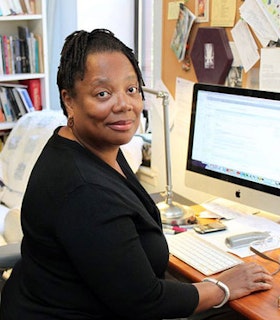Erica Hunt

As for the last year—there is a saying, I think of Balzac's that, 'happiness writes in white ink;' but here the exception must disprove the rule, for while the award from FCPA affirmed in a deep way my connection to writing and literary art, it also supported a great quantity of activity.
- Erica Hunt, March 13, 2003
Artist Statement
Years ago, I was asked whether my poems are about "real things." It was a challenging question then, and made even more challenging by current events, which have introduced to us in intimate terms degrees of violence, real everyday for three-fourths of the world. That question about poetry and the "real" jostles the horizon for poetry: how does aggressively speculative writing, strategies of intensification, opacity/excavation/illumination have value beyond their practice, to influence the world in which we live?
Poetry makes a path out of ordinary language, contesting the ordinary claims about the "real." Ordinary language is frequently instrumental, instructional, direct, prescriptive and remunerative, the language of enlistment and persuasion. But it is in the non-instrumental language of poetry in which the lapidary, the spare, mysterious, disjunctive, molecular, muscular, anagrammatic (and so on) provide previously undetected links to thinking and acting on alternatives and to building a just society. (Swords into plowshares, plowshares into ribbons, ribbons into irons, irons into kites.
As is true with many poets, I am drawn to language for its music, for language's capacity to limn thought, its connection to experience, its power to still and magnify the world while one writes/reads the world/book. But equally, I have been interested in techniques that purposely unsettle the crisp ride and appropriate shade of register and vocabulary. I like to read or write to topple the balance between controlled allusion and opacity. And so I have been drawn to the disjunctions of surrealism, Oulippians, improvisers and scat cats as aesthetic methods to seek new and unsuspected connection. This makes it sound like too tranquil an operation: I write poems that teeter on the verge of legibility, blur private and public, set boundaries anew and implicate us as practitioners of this moment and the next.
- 2002
Biography
Erica Hunt is a poet, essayist, and author. Her poetry practice incorporates the personal, the political, and the avant-garde. Hunt collaborated with visual artist Alison Saar on Arcade (1996), which features her poems alongside woodcut illustrations by Saar. Arcade approaches the subject of the self and its expression in contemporary society through abstraction that is rooted in everyday experience.
Hunt is known for her essays, "Notes for an Oppositional Poetics" (1990) and "Reflections on the Black Avant-Garde" (2002). Her writing was included in the anthology Moving Borders: Three Decades of Innovative Writing by Women (1998) and Ron Silliman's In the American Tree (2002). With funds from her 2001 Grants to Artists award, Hunt released Piece Logic (2002) and a revised edition of her Local History was published in 2003. After receiving her FCPA grant, Hunt released the chapbooks Time slips/right/before your eyes (2006) and A day and its approximates (2013). Hunt's work has also appeared in BOMB, Brooklyn Rail, Conjunctions, Poetics Journal, Boundary 2, Tripwire, and Recluse.
Subsequent to Hunt's 2001 FCPA grant, she was a 2005-2006 Fellow in Poetics and Poetic Practice at the Center for Programs in Contemporary Writing, University of Pennsylvania. Prior to her 2001 Grants to Artists award, Hunt was a Djerassi Resident Artists Program Fellow (1989), a Blue Mountain Center Fellow (1992), and the recipient of a Fund for Poetry award (1992).
Hunt graduated with a B.A. in English from San Francisco State University in 1980 and she received an M.F.A. from Bennington College in 2013. She is on the Board of the Proteus Fund.